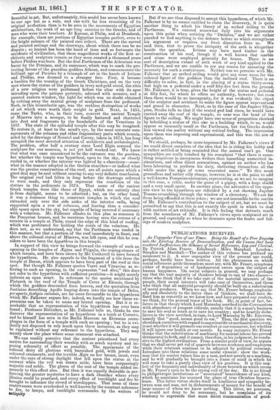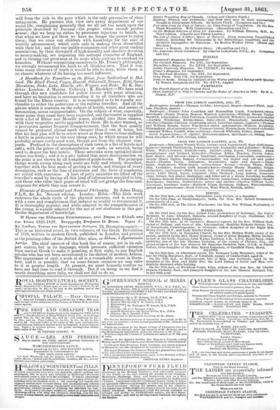PUBLICATIONS RECEIVED.
An Unpopular View of our Times. Beiny the Result of a Free Enquiry into the Existing Sources of Demoralisation, and the Causes that have rendered Inefficacious the Schemes of Social Reformers, Lay and Clerical. By Patrick Allan Fraser. Edinburgh : Miles Macphail. London : Simpkin and Marshall.—The author of this volume has prefixed no misnomer to it. A more unpopular view of the present age could, perhaps, hardly have been written. All the phenomena on which social reformers pride themselves most are, with Mr. Fraser, symptoms either of degeneracy or of fundamental errors upon the subject of human happiness. On social subjects in general, we may perhaps say that the vast majority of thinkers belong to one of two classes— those who think that if we take care of the material interests of the people, their moral interests will take care of themselves, and those who think that all material prosperity should be built on a substratum of moral goodness. When we say that Mr. Fraser belongs emphatic- ally and absolutely to the latter class of thinkers, we shall have de- fined him as correctly as we know how, and have prepared our readers, we think, for the general tenor of his book. He, in point of fact, be- lieves in that theory which Lord Macaulay ascribed to the Covenanters with abundance of pungent ridicule, namely that it is a man's business to save his soul as much as to save his country; and he heartily disbe- lieves in the view ascribed, in turn, to Lord Macaulay by Mr. Emerson, namely that "good, means good to eat." Thus, the first question we should ask ourselves with regard to anyscientific or mechanical discovery, is not whether it will promote our comfort or our commerce, but whether it will injure our health or our morals. In many instances Mr. Fraser thinks that the substitution of machinery for manual labour has proved detrimental to both, and it cannot, therefore? in his judgment, be condu- cive to the highest civilization. From a similar point of view, he argues that we shall never get rid of quarrels between workmen and employers while their relations continue to be adjusted by political economy. Introduce into these relations some moral element: show the work- man that his master values him as a man, and not merely as a machine, and he will gradually be brought into a frame of mind in which he will cease to take a purely class view of his position. It is this neg- lect of the humanity and individuality of those beneath us which seems in Mr. Fraser's eyes to be the crying evil of the day. He is no friend to philanthropic institutions or' associated" benevolence of any kind, which he maintains has usurped the place of true Christian benevo- lence. This latter virtue shows itself an kindliness and sympathy be- tween man and man, not in disbursements of money for the benefit of large masses of whom we know nothing. This latter, we presume, he would not deny to be necessary, but he complains of its tendency to supersede that more direct communication of good. will from the rich to the poor which is the only preventive of class antagonism. He .ptirsues this view into every department of our social life, complaining generally that we all act too much upon the principle described by Juvenal-the proyter vitam vivendi perdere eaw.tas: that we heap up riches by processes injurious to health, so that when we have got them we have no longer the power to enjoy them; that we cram our children with knowledge for the sake of worldly advancement, which ends only in making them dissatisfied with their lot ; and that our public companies and other great trading associations, by their disregard of high morality and absolute devotion to money-main g, are impairing the national character of England, and so ruining our greatness at its roots while striving to overload its branches. Without committing ourselves to Mr. Fraser's philosophy, we strongly recommend his book to all thinking men. That it con- tains many elements of truth it would be idle to deny, while there is no chance whatever of its having too much influence.
Handbook for Travellers on the Rhine, from Switzerland to Hol- land. The Black Forest,Fosges, Haardt, Odenwald, Taunus, Eifel Seven Mountains, Nahe, Lahn, Moselle, .4hr, trumer, and Ruhr. By K. Bae- deker. London: J. Murray. Cobleniz : K. Baedeker.-We have read through this new candidate for public favour with great attention, and have no hesitation in recommending it to all travellers who are bound for the Rhine country. It is so compiled as to be equally ser- viceable to either the pedestrian or the railway traveller. And all the advice which it contains on the subject of hotels, wines, and means of locomotion, seems unimpeachable. On the subject of wine, especially,. more pains than usual have been expended, and the tourist is supplied with a list of Rhine and Moselle wines, divided into three classes, with their respective merits appended to them. He is also warned, as a precaution against frequent disappointment, that the best quality cannot be procured abroad much cheaper than it can at home, but that his best plan will be to select wines at from three to four shillings a bottle in preference to the very cheap ones, by which means he will probably secure really good wine, though not from the choicest vine- yards. Prefixed to the description of each town is a list of hotels and cafés,- with the prices of accommodation at each; an asterisk being used to denote the best hotels. These asterisks seem sprinkled about rather too freely; and it is a pity indeed that more discrimination on the point is not shown by all compilers of guide-books. The principal things worth seeing along each route are fully and clearly described, together with the best mode of getting at them, and charges of every description, such as the fees of picerones and the fares of coachmen, are stated with exactness. A host of petty anxieties are lifted off the traveller's mind by having all this kind of information supplied to him, and those who value their peace of mind will not grudge the four-and- sixpence for which they may secure it.
Elements of Elperimental and Natural Philosophy. By Jabez Hogg, FIL.S., &c. &c. Second edition. London : Bohn.-This little work embraces the whole circle of the physical sciences, and is executed with a care and completeness that induces us readily to recommend it. It is thoroughly popular, and while adapted to the comprehension of the young,i
ung, s equally adapted for the use of seri studiorunt in this par- department of knowledge.
li Hpects "-qv EXAlpticris Effavarrarews, Trot Italpaz ev EXXaat a7ro you Emus 1821-1828. 2vvyyparin) 2ropavov e. 'Revov. Tope's A'.
Ev Aovatve, Ttarote rov Epyrravtoov Asrepor, 33, Brompton-square.- This is an historical novel, in two volumes, of the Greek Revolution of 1821, written in modern Greek, published in London, and printed at the printing-office of the British Star, alias, or Won, 6 13yEravvin6r
A■rriP• The chief interest of this book lies of course not in its sub- lect matter, but in its language, which presents sufficient variation from ancient Greek to make it puzzling, at first sight, to any English scholar who has not been accustomed to the dialect of modern Athens. The appearance of such a work at all is a remarkable event in litera- ture, and it is possible that on some future occasion we may refer to it at greater length. At present, we must honestly confess we have not had time to read it through. But if on doing so we find it worth describing more fully, we shall not fail to do so. Black's Travelling Map of Canada. (Adam and Charles Black.) Reading, Writing, and Arithmetic: and How they may be more successfully Taught in Elementary Schools. By Robert Floyd. (Longman and (10.) Foot-nota from the Page of Nature; or, First Forms of Vegetation. By the Rev. Hugh Macmillan. With illustrations. (Macmillan and Co.)
On the Medical Selection of Lives for Assurance. By William Minton, M.B., aa. Third edition. (Charles and Edwin Layton.)
The Life of Jeanne trAlbret, Queen of Navarre. From numerous Unpublished Sources, including MS Documents in the Bibliotheque Impdriale, and the Archives Espagnoles de Simancaa. By Martha Walker Freer. (Murat and Blackett) Cavour: a Memoir. By Edward Dicey. (Macmillan and Co.) The American Crisis Considered. By Charles Lempriere, &a and Co.) SERIALS.
Blacktvood's Magazine, for September.
The Cornhill Magazine. No. X.X.I., for September.
Macmillan's Magazine. No. XXIII., for September.
Dublin University Magazine. No. CCCXLV., for September.
Praser's Magazine, for September.
The Spiritual Magazine. No. XXI., for September.
Orley Farm. Part VIL, for September.
Notes on Books. Being an Analysis of the Works published daring each Quarter
by Messrs. Longman and Co. No. XXVL, August.
PAMPHLETS.
The Fourth Report of the Clerical FUJ111. Short Journal of a Visit to Canada and the States of Antericain 1860. By Et. A.
Slaney, 1EP.
(Longman































 Previous page
Previous page